University Business Law Case Study: BAA215 Karacal Kitchens Analysis
VerifiedAdded on 2023/04/11
|9
|1793
|169
Case Study
AI Summary
This document presents a comprehensive analysis of a business law case study involving Karacal Kitchens. The case explores several key legal principles, including the formation and enforceability of contracts, the concept of privity of contract, and the legal implications of contracts with minors. The analysis examines agreements between various parties, such as the partnership, Barry Brickle, Nia Netsuke, and Mark Smith, to determine the existence of valid contracts. It delves into the rules of agreements, including offer, acceptance, consideration, and intention to create legal relations. The analysis also addresses whether Nia can use the legal principle of privity of contract to avoid payment to Karacal Kitchens, considering potential exceptions. Furthermore, the document evaluates the enforceability of a contract with a minor (Mark Smith), considering the relevant statutory and common law rules. The case study applies legal principles to the facts, providing reasoned conclusions on the enforceability of agreements and the application of legal doctrines.
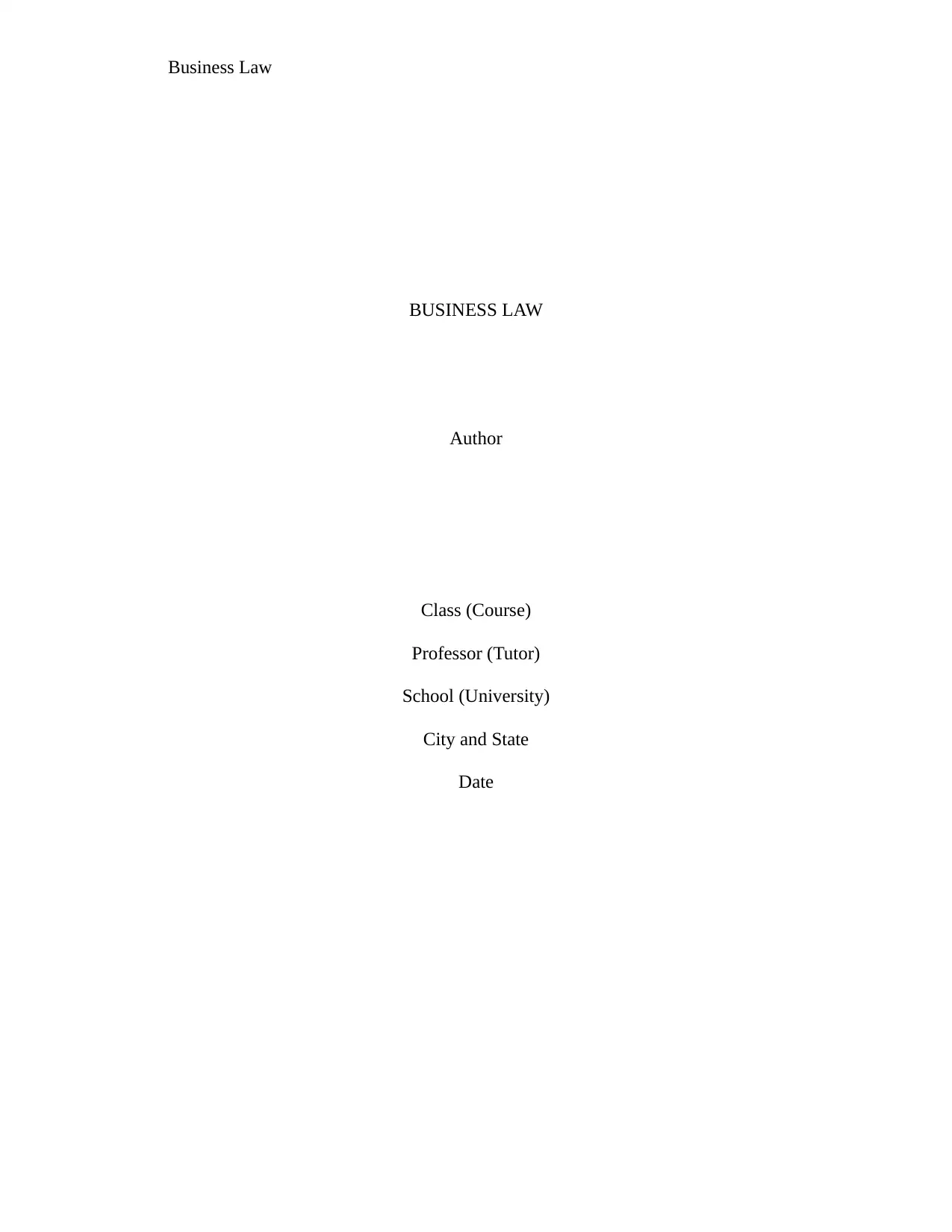
Business Law
BUSINESS LAW
Author
Class (Course)
Professor (Tutor)
School (University)
City and State
Date
BUSINESS LAW
Author
Class (Course)
Professor (Tutor)
School (University)
City and State
Date
Paraphrase This Document
Need a fresh take? Get an instant paraphrase of this document with our AI Paraphraser
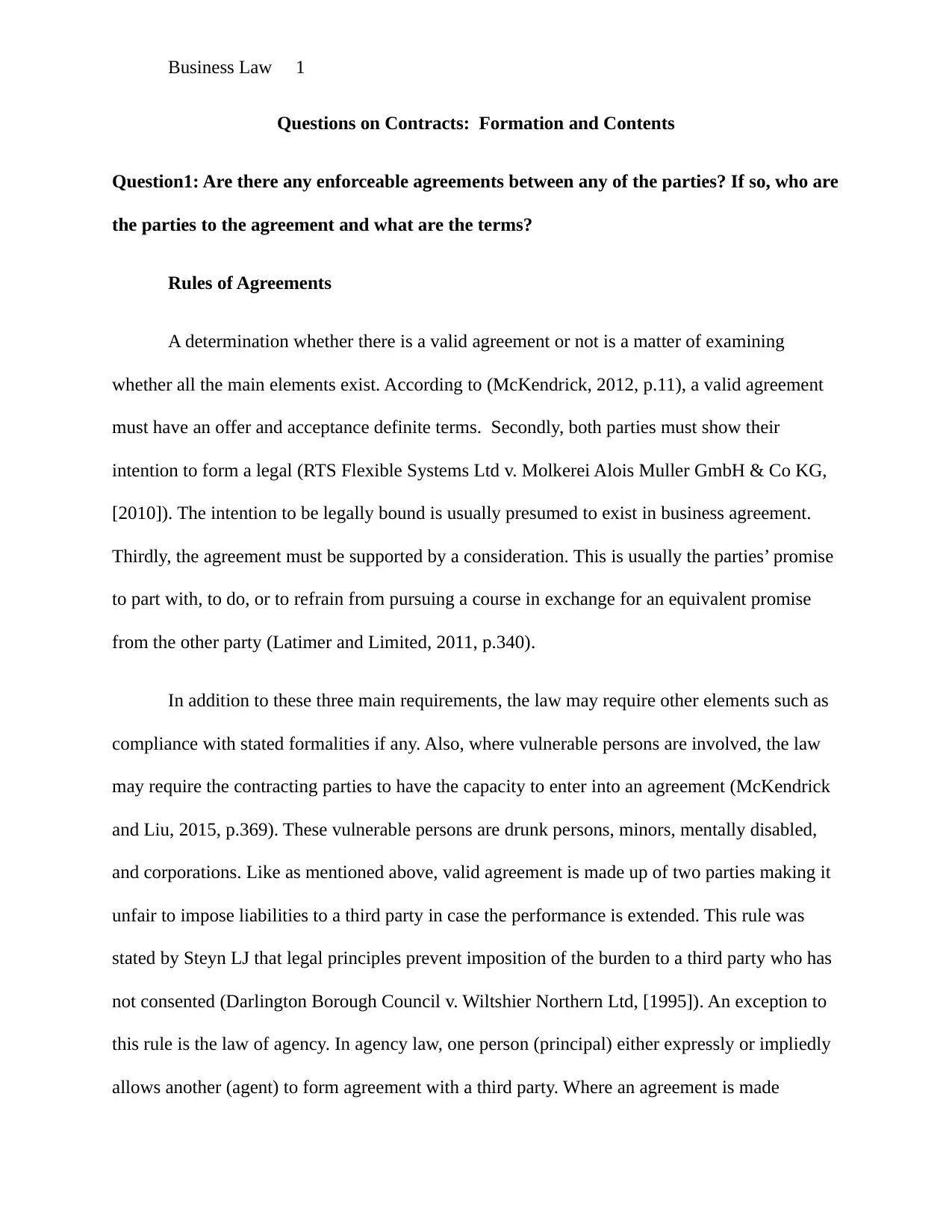
Business Law 1
Questions on Contracts: Formation and Contents
Question1: Are there any enforceable agreements between any of the parties? If so, who are
the parties to the agreement and what are the terms?
Rules of Agreements
A determination whether there is a valid agreement or not is a matter of examining
whether all the main elements exist. According to (McKendrick, 2012, p.11), a valid agreement
must have an offer and acceptance definite terms. Secondly, both parties must show their
intention to form a legal (RTS Flexible Systems Ltd v. Molkerei Alois Muller GmbH & Co KG,
[2010]). The intention to be legally bound is usually presumed to exist in business agreement.
Thirdly, the agreement must be supported by a consideration. This is usually the parties’ promise
to part with, to do, or to refrain from pursuing a course in exchange for an equivalent promise
from the other party (Latimer and Limited, 2011, p.340).
In addition to these three main requirements, the law may require other elements such as
compliance with stated formalities if any. Also, where vulnerable persons are involved, the law
may require the contracting parties to have the capacity to enter into an agreement (McKendrick
and Liu, 2015, p.369). These vulnerable persons are drunk persons, minors, mentally disabled,
and corporations. Like as mentioned above, valid agreement is made up of two parties making it
unfair to impose liabilities to a third party in case the performance is extended. This rule was
stated by Steyn LJ that legal principles prevent imposition of the burden to a third party who has
not consented (Darlington Borough Council v. Wiltshier Northern Ltd, [1995]). An exception to
this rule is the law of agency. In agency law, one person (principal) either expressly or impliedly
allows another (agent) to form agreement with a third party. Where an agreement is made
Questions on Contracts: Formation and Contents
Question1: Are there any enforceable agreements between any of the parties? If so, who are
the parties to the agreement and what are the terms?
Rules of Agreements
A determination whether there is a valid agreement or not is a matter of examining
whether all the main elements exist. According to (McKendrick, 2012, p.11), a valid agreement
must have an offer and acceptance definite terms. Secondly, both parties must show their
intention to form a legal (RTS Flexible Systems Ltd v. Molkerei Alois Muller GmbH & Co KG,
[2010]). The intention to be legally bound is usually presumed to exist in business agreement.
Thirdly, the agreement must be supported by a consideration. This is usually the parties’ promise
to part with, to do, or to refrain from pursuing a course in exchange for an equivalent promise
from the other party (Latimer and Limited, 2011, p.340).
In addition to these three main requirements, the law may require other elements such as
compliance with stated formalities if any. Also, where vulnerable persons are involved, the law
may require the contracting parties to have the capacity to enter into an agreement (McKendrick
and Liu, 2015, p.369). These vulnerable persons are drunk persons, minors, mentally disabled,
and corporations. Like as mentioned above, valid agreement is made up of two parties making it
unfair to impose liabilities to a third party in case the performance is extended. This rule was
stated by Steyn LJ that legal principles prevent imposition of the burden to a third party who has
not consented (Darlington Borough Council v. Wiltshier Northern Ltd, [1995]). An exception to
this rule is the law of agency. In agency law, one person (principal) either expressly or impliedly
allows another (agent) to form agreement with a third party. Where an agreement is made
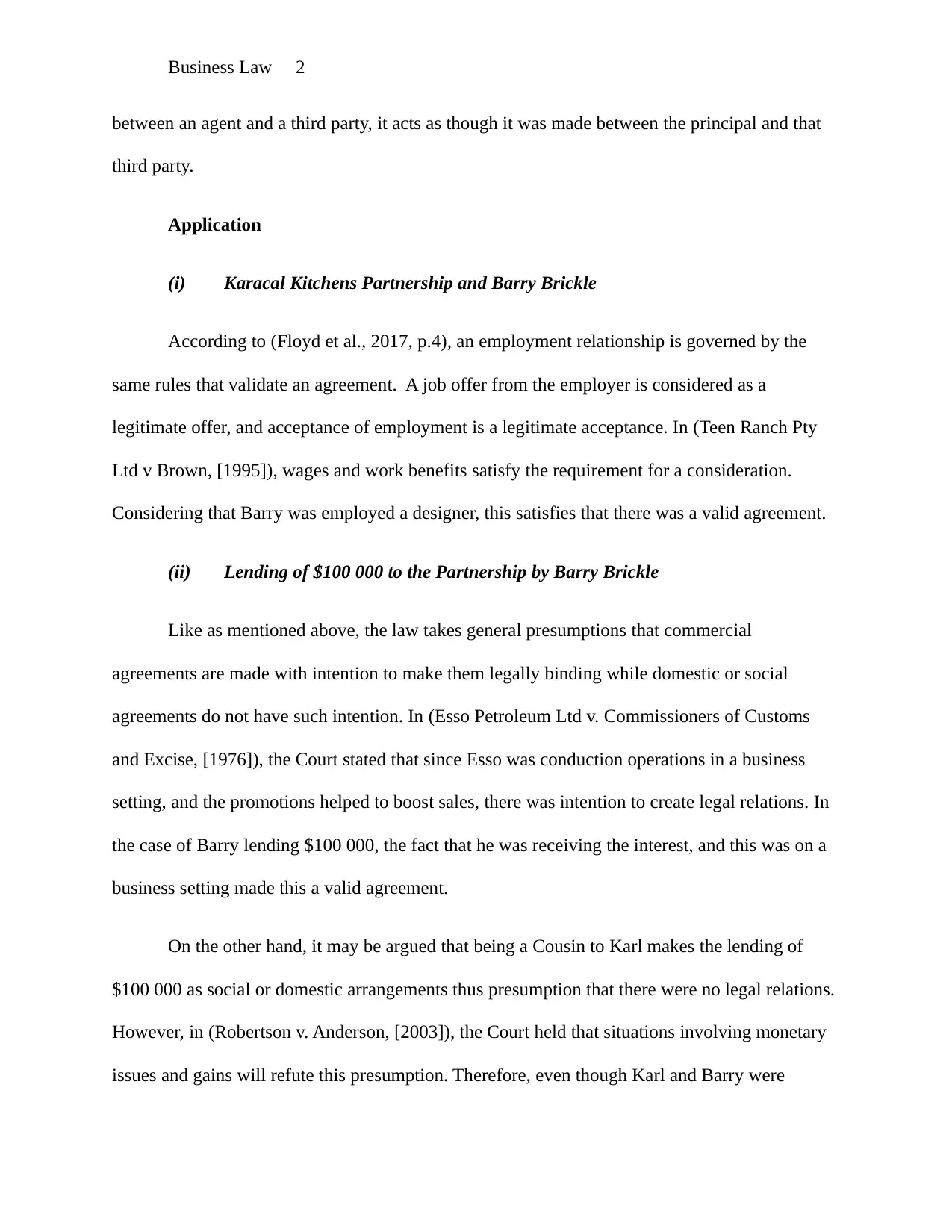
Business Law 2
between an agent and a third party, it acts as though it was made between the principal and that
third party.
Application
(i) Karacal Kitchens Partnership and Barry Brickle
According to (Floyd et al., 2017, p.4), an employment relationship is governed by the
same rules that validate an agreement. A job offer from the employer is considered as a
legitimate offer, and acceptance of employment is a legitimate acceptance. In (Teen Ranch Pty
Ltd v Brown, [1995]), wages and work benefits satisfy the requirement for a consideration.
Considering that Barry was employed a designer, this satisfies that there was a valid agreement.
(ii) Lending of $100 000 to the Partnership by Barry Brickle
Like as mentioned above, the law takes general presumptions that commercial
agreements are made with intention to make them legally binding while domestic or social
agreements do not have such intention. In (Esso Petroleum Ltd v. Commissioners of Customs
and Excise, [1976]), the Court stated that since Esso was conduction operations in a business
setting, and the promotions helped to boost sales, there was intention to create legal relations. In
the case of Barry lending $100 000, the fact that he was receiving the interest, and this was on a
business setting made this a valid agreement.
On the other hand, it may be argued that being a Cousin to Karl makes the lending of
$100 000 as social or domestic arrangements thus presumption that there were no legal relations.
However, in (Robertson v. Anderson, [2003]), the Court held that situations involving monetary
issues and gains will refute this presumption. Therefore, even though Karl and Barry were
between an agent and a third party, it acts as though it was made between the principal and that
third party.
Application
(i) Karacal Kitchens Partnership and Barry Brickle
According to (Floyd et al., 2017, p.4), an employment relationship is governed by the
same rules that validate an agreement. A job offer from the employer is considered as a
legitimate offer, and acceptance of employment is a legitimate acceptance. In (Teen Ranch Pty
Ltd v Brown, [1995]), wages and work benefits satisfy the requirement for a consideration.
Considering that Barry was employed a designer, this satisfies that there was a valid agreement.
(ii) Lending of $100 000 to the Partnership by Barry Brickle
Like as mentioned above, the law takes general presumptions that commercial
agreements are made with intention to make them legally binding while domestic or social
agreements do not have such intention. In (Esso Petroleum Ltd v. Commissioners of Customs
and Excise, [1976]), the Court stated that since Esso was conduction operations in a business
setting, and the promotions helped to boost sales, there was intention to create legal relations. In
the case of Barry lending $100 000, the fact that he was receiving the interest, and this was on a
business setting made this a valid agreement.
On the other hand, it may be argued that being a Cousin to Karl makes the lending of
$100 000 as social or domestic arrangements thus presumption that there were no legal relations.
However, in (Robertson v. Anderson, [2003]), the Court held that situations involving monetary
issues and gains will refute this presumption. Therefore, even though Karl and Barry were
⊘ This is a preview!⊘
Do you want full access?
Subscribe today to unlock all pages.

Trusted by 1+ million students worldwide
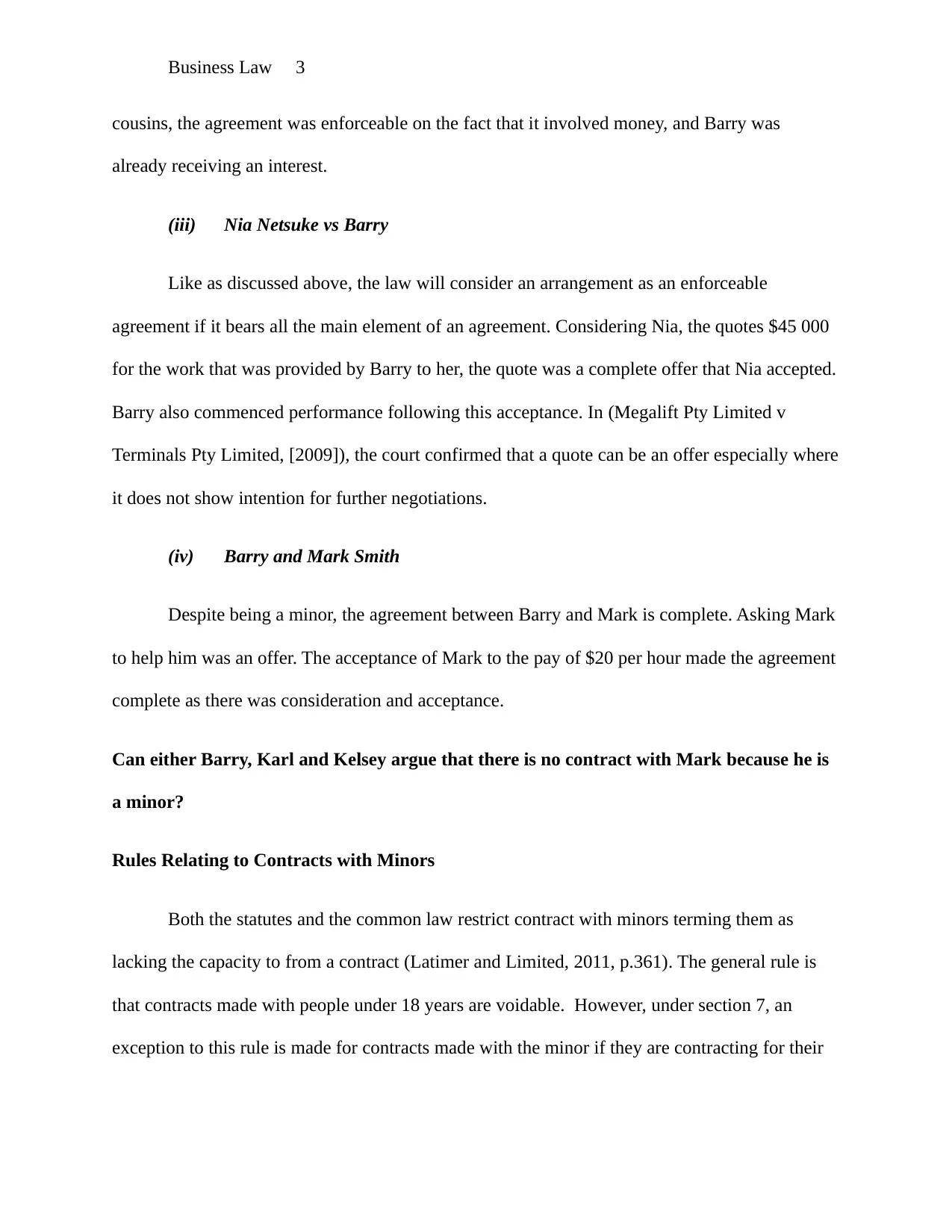
Business Law 3
cousins, the agreement was enforceable on the fact that it involved money, and Barry was
already receiving an interest.
(iii) Nia Netsuke vs Barry
Like as discussed above, the law will consider an arrangement as an enforceable
agreement if it bears all the main element of an agreement. Considering Nia, the quotes $45 000
for the work that was provided by Barry to her, the quote was a complete offer that Nia accepted.
Barry also commenced performance following this acceptance. In (Megalift Pty Limited v
Terminals Pty Limited, [2009]), the court confirmed that a quote can be an offer especially where
it does not show intention for further negotiations.
(iv) Barry and Mark Smith
Despite being a minor, the agreement between Barry and Mark is complete. Asking Mark
to help him was an offer. The acceptance of Mark to the pay of $20 per hour made the agreement
complete as there was consideration and acceptance.
Can either Barry, Karl and Kelsey argue that there is no contract with Mark because he is
a minor?
Rules Relating to Contracts with Minors
Both the statutes and the common law restrict contract with minors terming them as
lacking the capacity to from a contract (Latimer and Limited, 2011, p.361). The general rule is
that contracts made with people under 18 years are voidable. However, under section 7, an
exception to this rule is made for contracts made with the minor if they are contracting for their
cousins, the agreement was enforceable on the fact that it involved money, and Barry was
already receiving an interest.
(iii) Nia Netsuke vs Barry
Like as discussed above, the law will consider an arrangement as an enforceable
agreement if it bears all the main element of an agreement. Considering Nia, the quotes $45 000
for the work that was provided by Barry to her, the quote was a complete offer that Nia accepted.
Barry also commenced performance following this acceptance. In (Megalift Pty Limited v
Terminals Pty Limited, [2009]), the court confirmed that a quote can be an offer especially where
it does not show intention for further negotiations.
(iv) Barry and Mark Smith
Despite being a minor, the agreement between Barry and Mark is complete. Asking Mark
to help him was an offer. The acceptance of Mark to the pay of $20 per hour made the agreement
complete as there was consideration and acceptance.
Can either Barry, Karl and Kelsey argue that there is no contract with Mark because he is
a minor?
Rules Relating to Contracts with Minors
Both the statutes and the common law restrict contract with minors terming them as
lacking the capacity to from a contract (Latimer and Limited, 2011, p.361). The general rule is
that contracts made with people under 18 years are voidable. However, under section 7, an
exception to this rule is made for contracts made with the minor if they are contracting for their
Paraphrase This Document
Need a fresh take? Get an instant paraphrase of this document with our AI Paraphraser
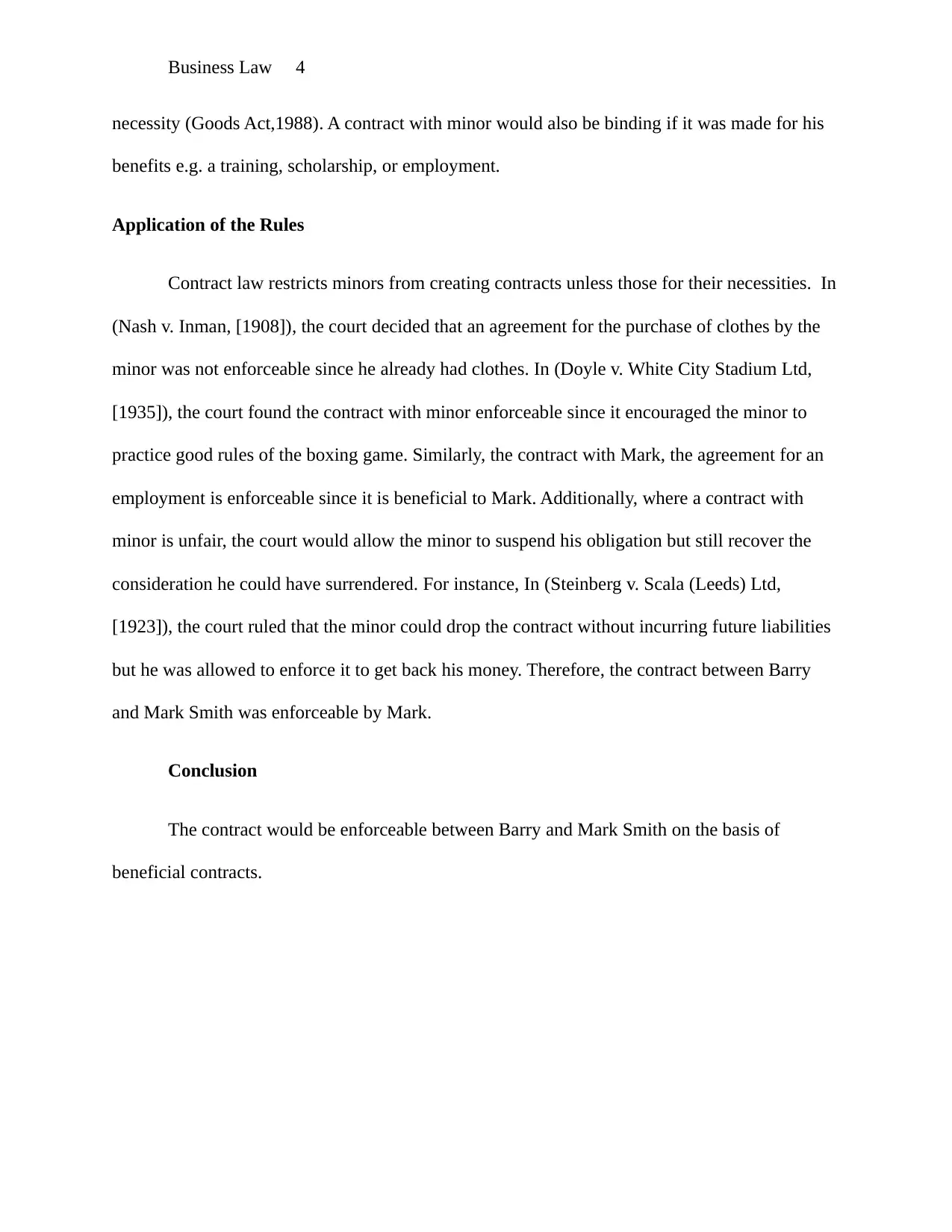
Business Law 4
necessity (Goods Act,1988). A contract with minor would also be binding if it was made for his
benefits e.g. a training, scholarship, or employment.
Application of the Rules
Contract law restricts minors from creating contracts unless those for their necessities. In
(Nash v. Inman, [1908]), the court decided that an agreement for the purchase of clothes by the
minor was not enforceable since he already had clothes. In (Doyle v. White City Stadium Ltd,
[1935]), the court found the contract with minor enforceable since it encouraged the minor to
practice good rules of the boxing game. Similarly, the contract with Mark, the agreement for an
employment is enforceable since it is beneficial to Mark. Additionally, where a contract with
minor is unfair, the court would allow the minor to suspend his obligation but still recover the
consideration he could have surrendered. For instance, In (Steinberg v. Scala (Leeds) Ltd,
[1923]), the court ruled that the minor could drop the contract without incurring future liabilities
but he was allowed to enforce it to get back his money. Therefore, the contract between Barry
and Mark Smith was enforceable by Mark.
Conclusion
The contract would be enforceable between Barry and Mark Smith on the basis of
beneficial contracts.
necessity (Goods Act,1988). A contract with minor would also be binding if it was made for his
benefits e.g. a training, scholarship, or employment.
Application of the Rules
Contract law restricts minors from creating contracts unless those for their necessities. In
(Nash v. Inman, [1908]), the court decided that an agreement for the purchase of clothes by the
minor was not enforceable since he already had clothes. In (Doyle v. White City Stadium Ltd,
[1935]), the court found the contract with minor enforceable since it encouraged the minor to
practice good rules of the boxing game. Similarly, the contract with Mark, the agreement for an
employment is enforceable since it is beneficial to Mark. Additionally, where a contract with
minor is unfair, the court would allow the minor to suspend his obligation but still recover the
consideration he could have surrendered. For instance, In (Steinberg v. Scala (Leeds) Ltd,
[1923]), the court ruled that the minor could drop the contract without incurring future liabilities
but he was allowed to enforce it to get back his money. Therefore, the contract between Barry
and Mark Smith was enforceable by Mark.
Conclusion
The contract would be enforceable between Barry and Mark Smith on the basis of
beneficial contracts.
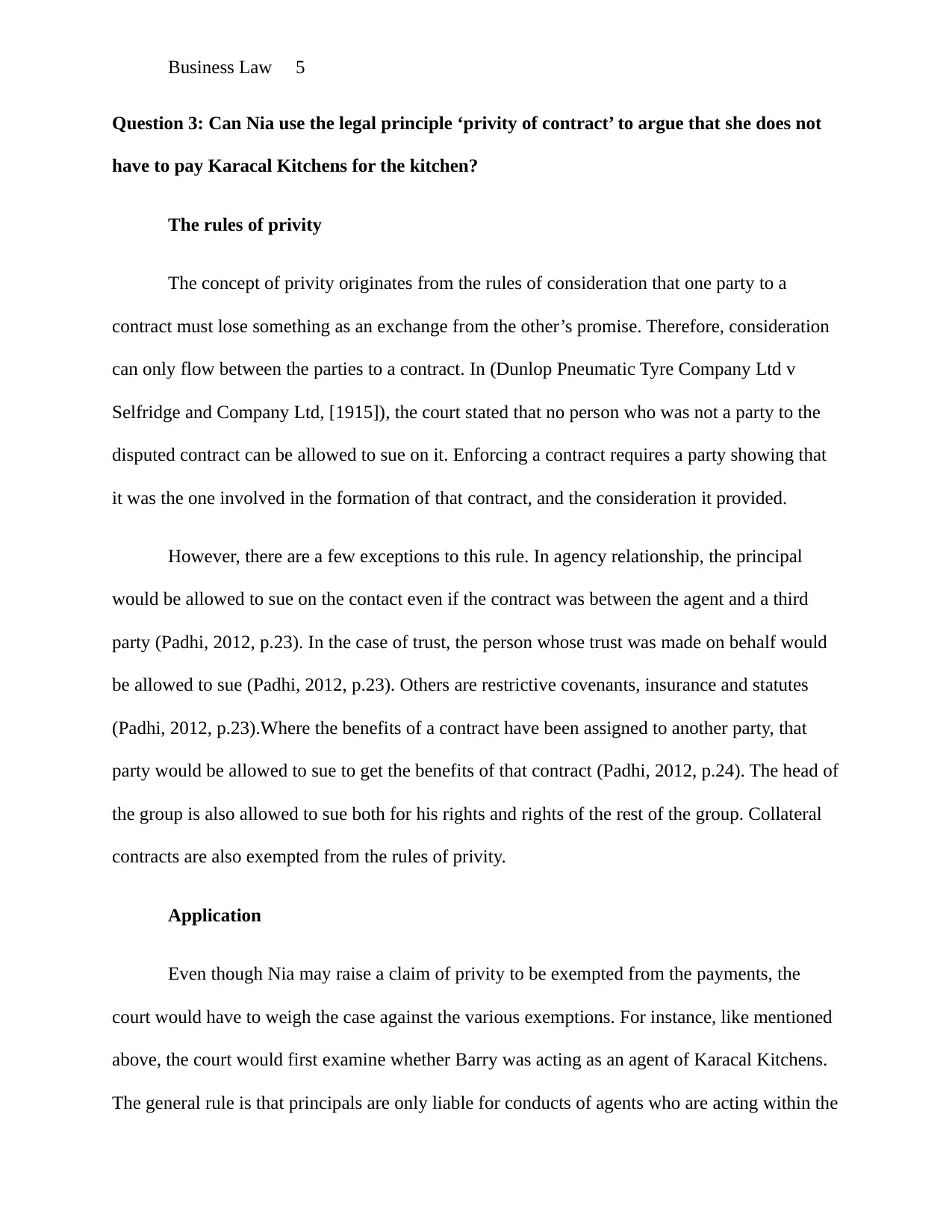
Business Law 5
Question 3: Can Nia use the legal principle ‘privity of contract’ to argue that she does not
have to pay Karacal Kitchens for the kitchen?
The rules of privity
The concept of privity originates from the rules of consideration that one party to a
contract must lose something as an exchange from the other’s promise. Therefore, consideration
can only flow between the parties to a contract. In (Dunlop Pneumatic Tyre Company Ltd v
Selfridge and Company Ltd, [1915]), the court stated that no person who was not a party to the
disputed contract can be allowed to sue on it. Enforcing a contract requires a party showing that
it was the one involved in the formation of that contract, and the consideration it provided.
However, there are a few exceptions to this rule. In agency relationship, the principal
would be allowed to sue on the contact even if the contract was between the agent and a third
party (Padhi, 2012, p.23). In the case of trust, the person whose trust was made on behalf would
be allowed to sue (Padhi, 2012, p.23). Others are restrictive covenants, insurance and statutes
(Padhi, 2012, p.23).Where the benefits of a contract have been assigned to another party, that
party would be allowed to sue to get the benefits of that contract (Padhi, 2012, p.24). The head of
the group is also allowed to sue both for his rights and rights of the rest of the group. Collateral
contracts are also exempted from the rules of privity.
Application
Even though Nia may raise a claim of privity to be exempted from the payments, the
court would have to weigh the case against the various exemptions. For instance, like mentioned
above, the court would first examine whether Barry was acting as an agent of Karacal Kitchens.
The general rule is that principals are only liable for conducts of agents who are acting within the
Question 3: Can Nia use the legal principle ‘privity of contract’ to argue that she does not
have to pay Karacal Kitchens for the kitchen?
The rules of privity
The concept of privity originates from the rules of consideration that one party to a
contract must lose something as an exchange from the other’s promise. Therefore, consideration
can only flow between the parties to a contract. In (Dunlop Pneumatic Tyre Company Ltd v
Selfridge and Company Ltd, [1915]), the court stated that no person who was not a party to the
disputed contract can be allowed to sue on it. Enforcing a contract requires a party showing that
it was the one involved in the formation of that contract, and the consideration it provided.
However, there are a few exceptions to this rule. In agency relationship, the principal
would be allowed to sue on the contact even if the contract was between the agent and a third
party (Padhi, 2012, p.23). In the case of trust, the person whose trust was made on behalf would
be allowed to sue (Padhi, 2012, p.23). Others are restrictive covenants, insurance and statutes
(Padhi, 2012, p.23).Where the benefits of a contract have been assigned to another party, that
party would be allowed to sue to get the benefits of that contract (Padhi, 2012, p.24). The head of
the group is also allowed to sue both for his rights and rights of the rest of the group. Collateral
contracts are also exempted from the rules of privity.
Application
Even though Nia may raise a claim of privity to be exempted from the payments, the
court would have to weigh the case against the various exemptions. For instance, like mentioned
above, the court would first examine whether Barry was acting as an agent of Karacal Kitchens.
The general rule is that principals are only liable for conducts of agents who are acting within the
⊘ This is a preview!⊘
Do you want full access?
Subscribe today to unlock all pages.

Trusted by 1+ million students worldwide
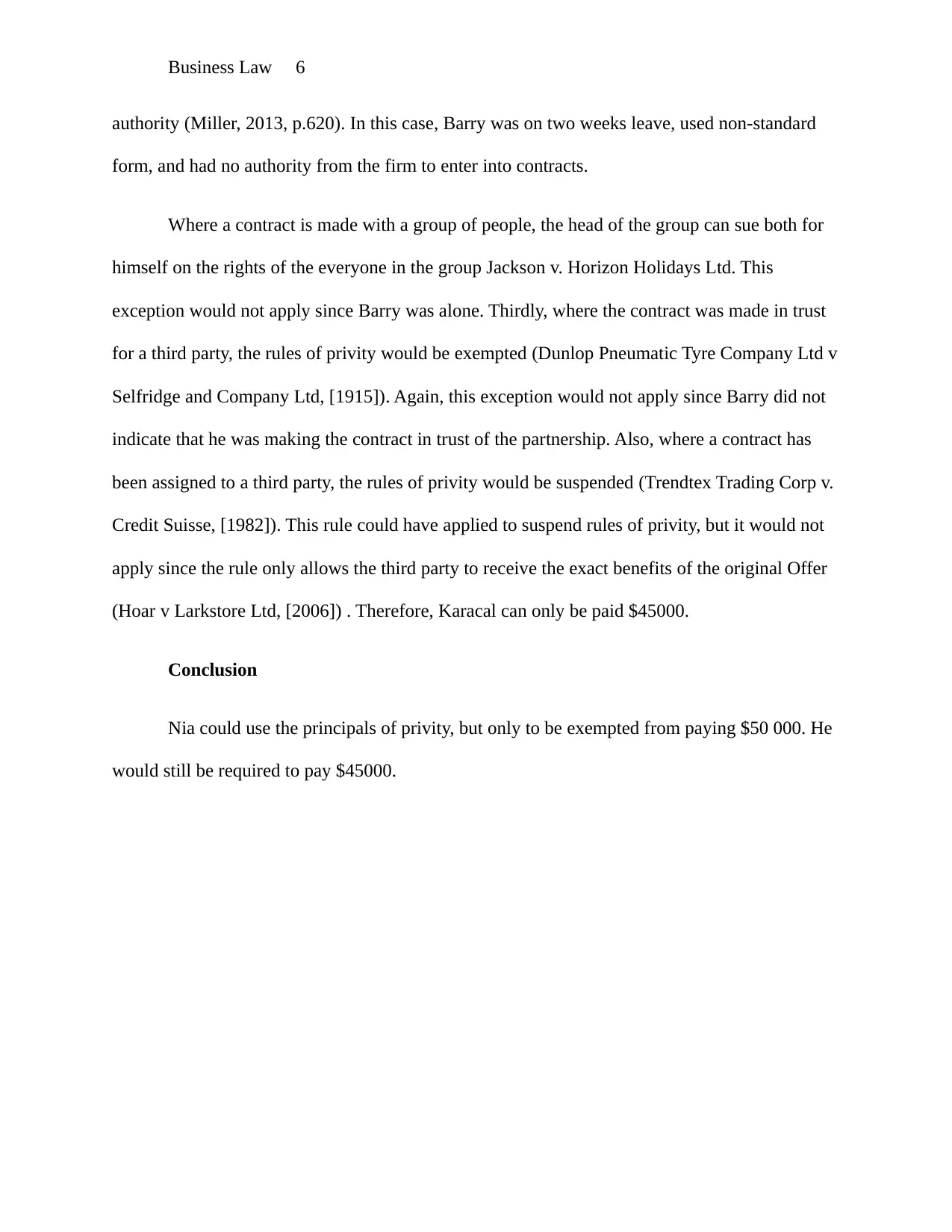
Business Law 6
authority (Miller, 2013, p.620). In this case, Barry was on two weeks leave, used non-standard
form, and had no authority from the firm to enter into contracts.
Where a contract is made with a group of people, the head of the group can sue both for
himself on the rights of the everyone in the group Jackson v. Horizon Holidays Ltd. This
exception would not apply since Barry was alone. Thirdly, where the contract was made in trust
for a third party, the rules of privity would be exempted (Dunlop Pneumatic Tyre Company Ltd v
Selfridge and Company Ltd, [1915]). Again, this exception would not apply since Barry did not
indicate that he was making the contract in trust of the partnership. Also, where a contract has
been assigned to a third party, the rules of privity would be suspended (Trendtex Trading Corp v.
Credit Suisse, [1982]). This rule could have applied to suspend rules of privity, but it would not
apply since the rule only allows the third party to receive the exact benefits of the original Offer
(Hoar v Larkstore Ltd, [2006]) . Therefore, Karacal can only be paid $45000.
Conclusion
Nia could use the principals of privity, but only to be exempted from paying $50 000. He
would still be required to pay $45000.
authority (Miller, 2013, p.620). In this case, Barry was on two weeks leave, used non-standard
form, and had no authority from the firm to enter into contracts.
Where a contract is made with a group of people, the head of the group can sue both for
himself on the rights of the everyone in the group Jackson v. Horizon Holidays Ltd. This
exception would not apply since Barry was alone. Thirdly, where the contract was made in trust
for a third party, the rules of privity would be exempted (Dunlop Pneumatic Tyre Company Ltd v
Selfridge and Company Ltd, [1915]). Again, this exception would not apply since Barry did not
indicate that he was making the contract in trust of the partnership. Also, where a contract has
been assigned to a third party, the rules of privity would be suspended (Trendtex Trading Corp v.
Credit Suisse, [1982]). This rule could have applied to suspend rules of privity, but it would not
apply since the rule only allows the third party to receive the exact benefits of the original Offer
(Hoar v Larkstore Ltd, [2006]) . Therefore, Karacal can only be paid $45000.
Conclusion
Nia could use the principals of privity, but only to be exempted from paying $50 000. He
would still be required to pay $45000.
Paraphrase This Document
Need a fresh take? Get an instant paraphrase of this document with our AI Paraphraser
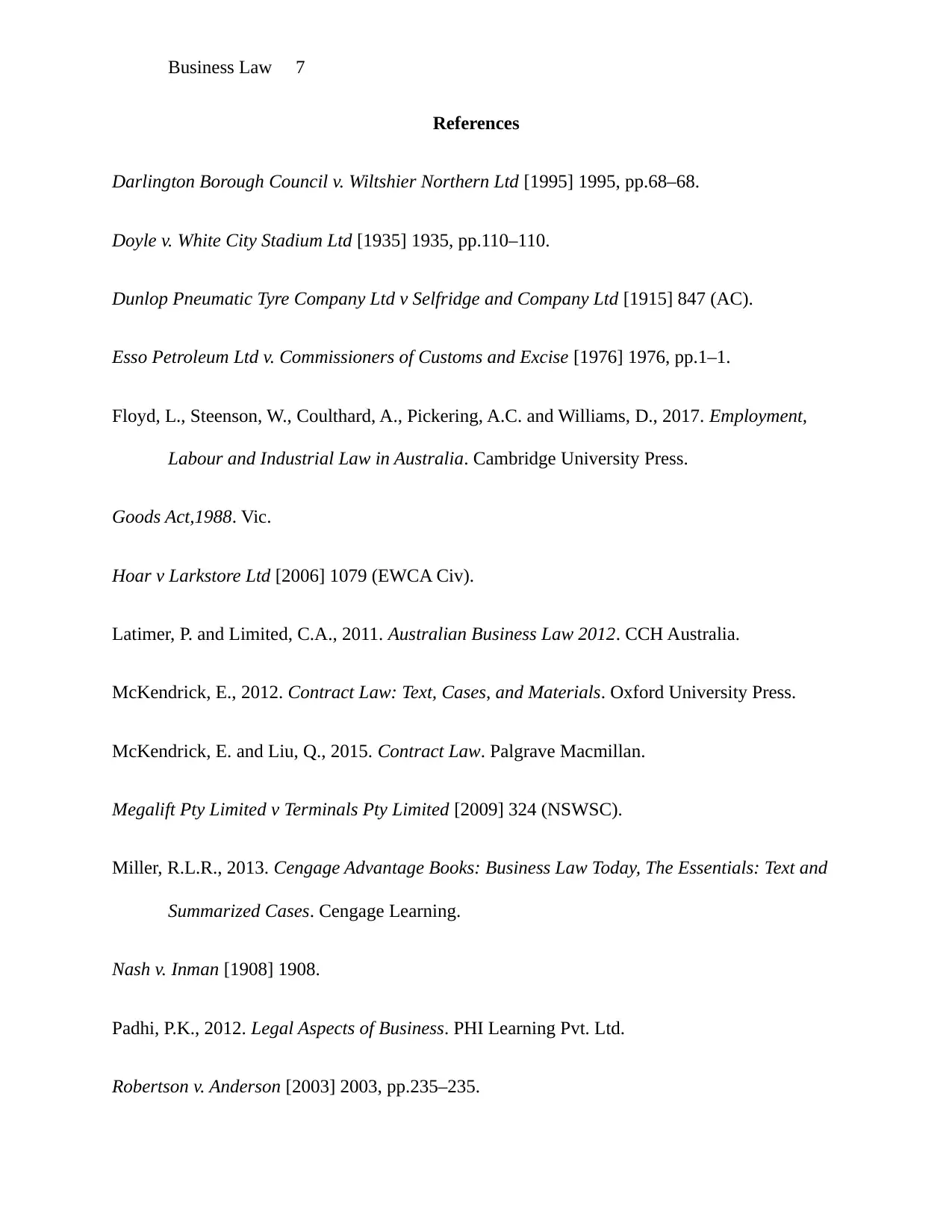
Business Law 7
References
Darlington Borough Council v. Wiltshier Northern Ltd [1995] 1995, pp.68–68.
Doyle v. White City Stadium Ltd [1935] 1935, pp.110–110.
Dunlop Pneumatic Tyre Company Ltd v Selfridge and Company Ltd [1915] 847 (AC).
Esso Petroleum Ltd v. Commissioners of Customs and Excise [1976] 1976, pp.1–1.
Floyd, L., Steenson, W., Coulthard, A., Pickering, A.C. and Williams, D., 2017. Employment,
Labour and Industrial Law in Australia. Cambridge University Press.
Goods Act,1988. Vic.
Hoar v Larkstore Ltd [2006] 1079 (EWCA Civ).
Latimer, P. and Limited, C.A., 2011. Australian Business Law 2012. CCH Australia.
McKendrick, E., 2012. Contract Law: Text, Cases, and Materials. Oxford University Press.
McKendrick, E. and Liu, Q., 2015. Contract Law. Palgrave Macmillan.
Megalift Pty Limited v Terminals Pty Limited [2009] 324 (NSWSC).
Miller, R.L.R., 2013. Cengage Advantage Books: Business Law Today, The Essentials: Text and
Summarized Cases. Cengage Learning.
Nash v. Inman [1908] 1908.
Padhi, P.K., 2012. Legal Aspects of Business. PHI Learning Pvt. Ltd.
Robertson v. Anderson [2003] 2003, pp.235–235.
References
Darlington Borough Council v. Wiltshier Northern Ltd [1995] 1995, pp.68–68.
Doyle v. White City Stadium Ltd [1935] 1935, pp.110–110.
Dunlop Pneumatic Tyre Company Ltd v Selfridge and Company Ltd [1915] 847 (AC).
Esso Petroleum Ltd v. Commissioners of Customs and Excise [1976] 1976, pp.1–1.
Floyd, L., Steenson, W., Coulthard, A., Pickering, A.C. and Williams, D., 2017. Employment,
Labour and Industrial Law in Australia. Cambridge University Press.
Goods Act,1988. Vic.
Hoar v Larkstore Ltd [2006] 1079 (EWCA Civ).
Latimer, P. and Limited, C.A., 2011. Australian Business Law 2012. CCH Australia.
McKendrick, E., 2012. Contract Law: Text, Cases, and Materials. Oxford University Press.
McKendrick, E. and Liu, Q., 2015. Contract Law. Palgrave Macmillan.
Megalift Pty Limited v Terminals Pty Limited [2009] 324 (NSWSC).
Miller, R.L.R., 2013. Cengage Advantage Books: Business Law Today, The Essentials: Text and
Summarized Cases. Cengage Learning.
Nash v. Inman [1908] 1908.
Padhi, P.K., 2012. Legal Aspects of Business. PHI Learning Pvt. Ltd.
Robertson v. Anderson [2003] 2003, pp.235–235.
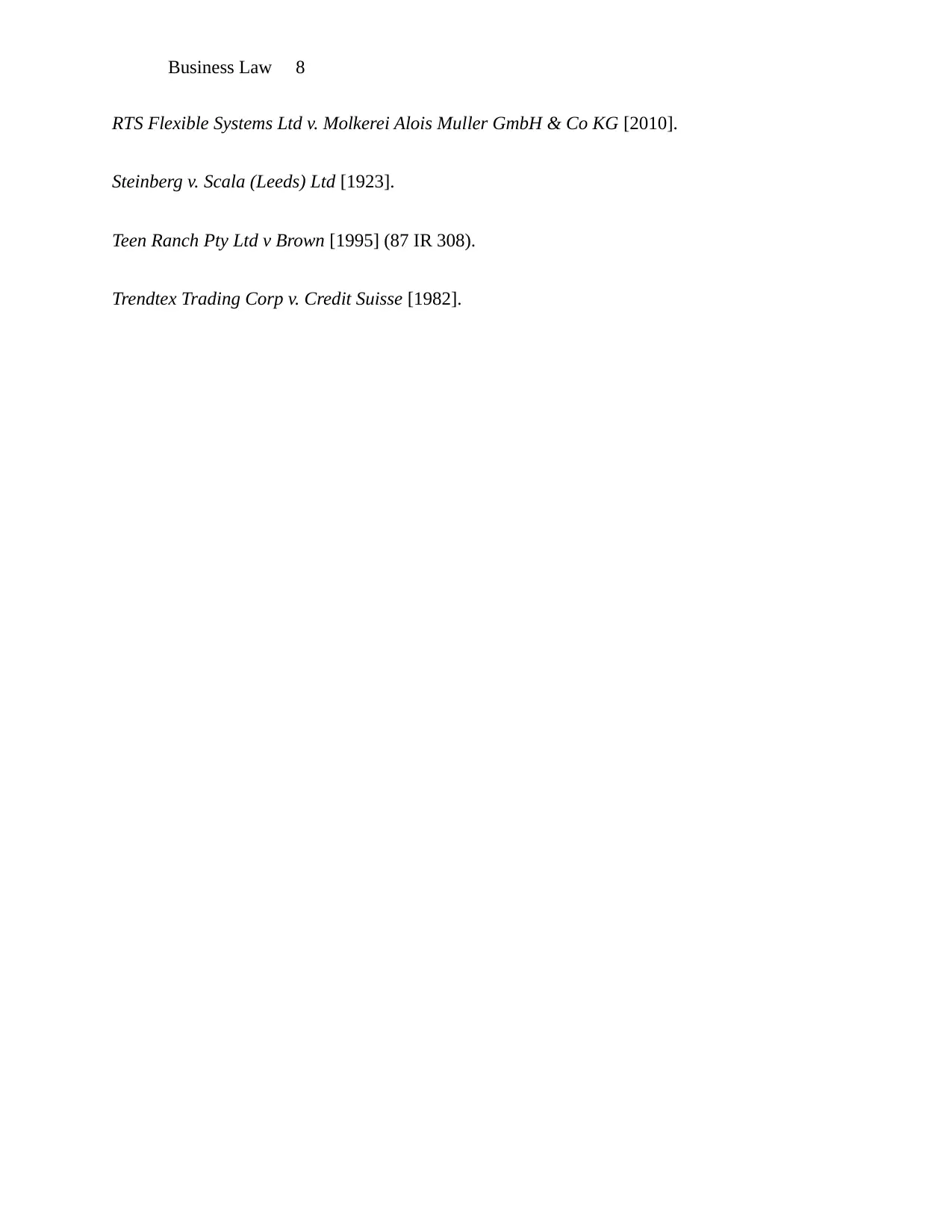
Business Law 8
RTS Flexible Systems Ltd v. Molkerei Alois Muller GmbH & Co KG [2010].
Steinberg v. Scala (Leeds) Ltd [1923].
Teen Ranch Pty Ltd v Brown [1995] (87 IR 308).
Trendtex Trading Corp v. Credit Suisse [1982].
RTS Flexible Systems Ltd v. Molkerei Alois Muller GmbH & Co KG [2010].
Steinberg v. Scala (Leeds) Ltd [1923].
Teen Ranch Pty Ltd v Brown [1995] (87 IR 308).
Trendtex Trading Corp v. Credit Suisse [1982].
⊘ This is a preview!⊘
Do you want full access?
Subscribe today to unlock all pages.

Trusted by 1+ million students worldwide
1 out of 9
Related Documents
Your All-in-One AI-Powered Toolkit for Academic Success.
+13062052269
info@desklib.com
Available 24*7 on WhatsApp / Email
![[object Object]](/_next/static/media/star-bottom.7253800d.svg)
Unlock your academic potential
Copyright © 2020–2026 A2Z Services. All Rights Reserved. Developed and managed by ZUCOL.




